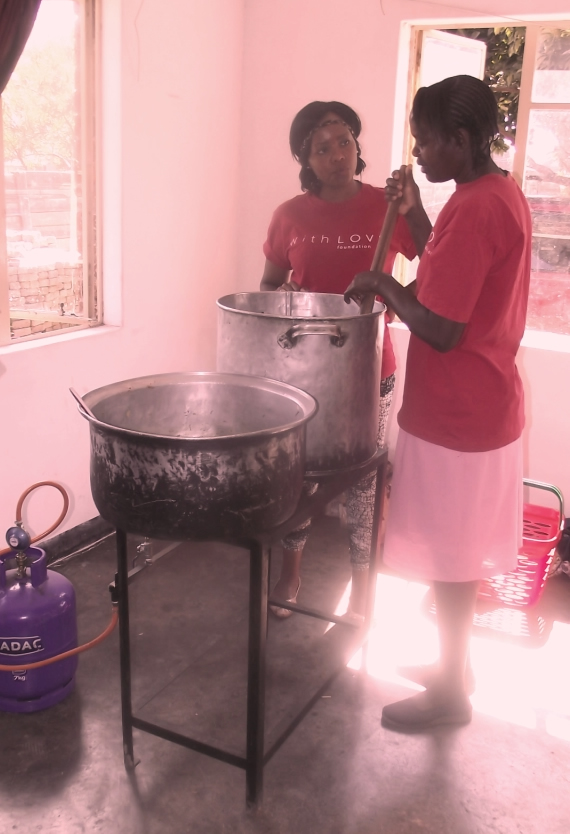The Recipe of Love
Wednesday, May 15th, 2013 by Varaidzo TagwireyiThe Recipe of Love: Ingredients
A few cloves of Garlic
Onions
Green beans
Tomatoes
1 Chinese cabbage
Sugar beans
2kg or so of stewing beef
8 packs of Royco Usavi Mix
5kg pasta
About 30 loaves Bread (I’m not entirely sure about this figure though!)
A fraction of a 2litre bottle of cooking oil
Green peppers (I cut these!)
4 Oxtail stock cubes
Salt
About 500g of flour
LOADS of water
And LOVE!Instructions
1.Begin the morning by collecting weekly donations and buying the remaining ingredients.
2.Get to the Lutheran Church, on Chatima road in Mbare.
3.Unload supplies and set up cooking equipment in one of the church’s halls.
4.Put a large pot of pasta to boil.
5.Fry up garlic, onions, tomatoes, and beef in cooking oil.
6.Slowly add the rest of the vegetables and seasoning, with water.
7.Have a good chat and few giggles over the large simmering pots.
8.Thicken with flour and add cooked pasta.
9.Boil for as long as possible.
10.Serve hot, with a smile and 2 slices of bread.Serves more than you would think – I estimate that well over 70 children, their mothers and grandmothers had a bowl, with many having seconds and even taking some home in the lunch boxes they had brought along with them.
Yesterday, I helped make this soup, (well, more like cut a few vegetables!) and saw firsthand the impact that so few ingredients can have on a struggling community. Every Tuesday afternoon, the With Love Foundation runs a soup kitchen from the Lutheran Church in Mbare, serving up a hearty soup with slices of fresh bread to hundreds of women and children in the community. The soup does not necessarily follow this recipe, as members of the foundation use whatever ingredients are available on any given Tuesday, and this, they say, has often made for some interesting soup variations.
Speaking with one of the foundation’s founding members, Chenai Mudede, over the large bubbling pots of ‘love soup’, I soon realized that this weekly labour of love was not easy to sustain, with the foundation’s members funding the majority of the initiative from their own pockets. Though the ingredients list may not seem like much, these weekly amounts certainly do add up to quite significant costs, which are becoming more and more challenging to sustain.
As she spoke, I looked around and compiled a mental shopping list of the ingredients I had seen thrown into the large pots, and thought to myself, “Surely it wouldn’t take much in the way of donations, to gather all these things on a weekly basis.” There is nothing outlandish on this list of ingredients! I began to imagine how much more soup could be made if Harare residents donated the odd packet of Usavi Mix here, or a packet of carrots there. It is, after all, the little things that count!
I first heard about the With Love Foundation soup kitchen towards the end of 2012 when I read a news report on what was then a fairly new initiative, and made it a New Year’s Resolution to get involved. However, like so many resolutions, it got tucked away on my never-ending to-do list. It wasn’t until mid-March 2013, when I met a lovely girl from the organization, that I was given a gentle but firm reminder of what I had promised I would do.
Yesterday, through a recent partnership between With Love Foundation and Kuumba Foundation Trust, a Christian organization I volunteer with, focused on rebuilding and maintaining healthy family structures, I finally found myself at the Lutheran Church on Chatima Rd, in Mbare, Harare, cutting green peppers, and setting up benches for the Women’s Parenting Workshop the two organizations had collaborated to host in conjunction with the weekly soup kitchen. While the soup bubbled away, members of the Kuumba Foundation Trust spoke to the group of mothers that had gathered, addressing parenting issues, centered especially on effective communication.
That soup smelt amazing and I found it hard to concentrate on the women’s workshop I had come for, as the rich aroma wafted throughout the churchyard, drawing larger crowds by the minute. I wish I could tell you all how wonderful the soup tasted, but unfortunately I didn’t get to have any. By the time I finished recording video and taking photos of the Women’s Parenting Workshop that was also taking place outside, all the soup was gone! Well, if the speed with which those two giant pots were emptied is any indication of the soup’s great taste, then it’s safe to conclude that this week’s batch was a culinary masterpiece.
I wonder what next week’s soup will have in it!
Did you know!
Already Baker’s Inn donates loaves of bread each week, Pioneer Gas provides a free monthly gas refill, and several individuals donate in cash and kind. If you would like to donate ingredients for next Tuesday’s soup, pledge ongoing support or volunteer your time, please contact With Love Foundation via their email address; info [at] withlove [dot] co [dot] zw, their Facebook page; www.facebook.com/WithLoveFoundation, or using their Twitter Handle; @WithLoveZim.










